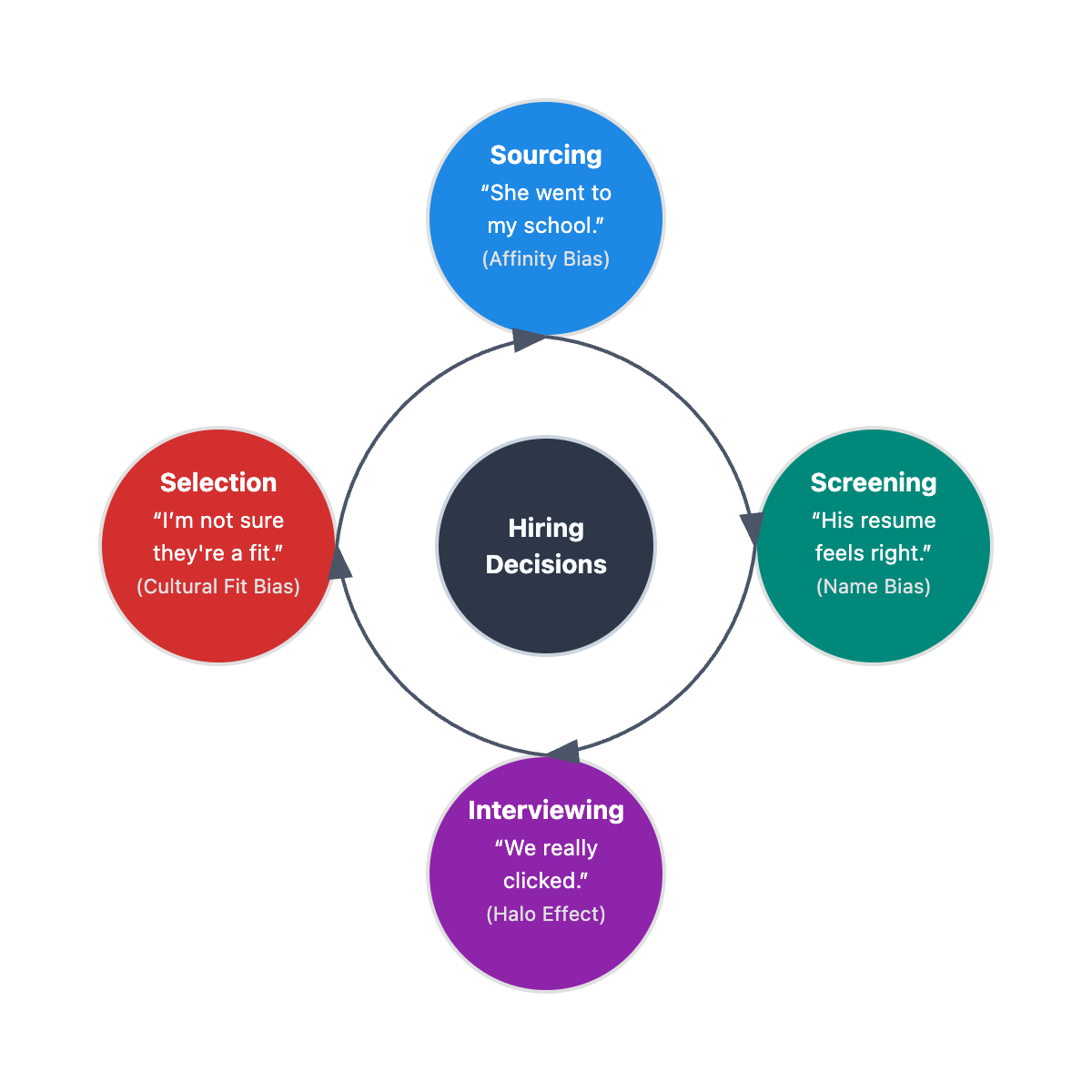In the previous unit, we discussed how certain types of bias can impact interview scorecards, but it’s important to recognize that bias can actually influence every stage of the hiring cycle, from sourcing and screening to interviewing and final selection.
In this unit, you’ll continue your journey toward more objective and equitable sales hiring by exploring the concept of affinity bias and how bias in general can shape the entire hiring process. As you progress through the course, you’ll also tackle other common interview biases. This includes confirmation bias, the halo and horns effect, and first impression bias. You'll equip yourself with practical strategies to make better hiring decisions and build stronger, more diverse sales teams.
Bias doesn’t just affect how you fill out an interview scorecard—it can shape the entire hiring cycle. For example:
- Sourcing: You might unconsciously gravitate toward candidates from familiar backgrounds or networks, limiting the diversity of your talent pool.
- Screening: Bias can lead you to favor resumes that “feel right” based on names, schools, or previous employers, rather than focusing on relevant sales experience and skills.
- Interviewing: During interviews, biases like affinity bias, confirmation bias, or the halo effect can cause you to ask easier questions, overlook weak answers, or rate candidates higher based on personal connection or a single strong trait.
- Selection: When making final decisions, bias can influence how you weigh feedback from different interviewers or interpret ambiguous information, sometimes leading to the selection of candidates who feel familiar rather than those who are most qualified.
The image below illustrates how bias can creep in at each stage of the hiring cycle, visually highlighting the points where unconscious bias can affect hiring decisions:

In sales hiring, where rapport and likability are often seen as assets, these biases can be especially problematic. If you let personal similarity or first impressions drive your evaluation, you risk missing out on candidates who bring fresh perspectives or overrating someone simply because they feel familiar. To check your objectivity, pause and ask yourself: "Am I basing my recommendation on the candidate’s actual sales achievements, or just on how much I enjoyed the conversation?" Reviewing your notes for specific, job-related evidence—rather than gut feelings—helps ensure your decision is fair and grounded.
Affinity bias is the tendency to favor candidates who remind you of yourself or someone you like. In interviews, this can subtly influence your judgment. For example, you might find yourself thinking, "They just seem like someone I'd get along with at work," or feeling more relaxed and supportive when a candidate shares your alma mater or hobbies. Sometimes, you may even overlook a weak answer because you “click” with the candidate, or you might ask easier follow-up questions to someone who reminds you of a favorite former colleague.
To minimize the influence of affinity bias and other biases, focus on behavioral evidence rather than personal connection. For instance, instead of writing "Great energy, reminds me of me," anchor your notes in observable actions like "Closed 5 new accounts in Q2 by cold-calling." Using structured scorecards with clear criteria for each competency also helps keep your evaluation objective. It’s important to separate rapport from evaluation; while building rapport is valuable, it should not sway your ratings. If you catch yourself thinking, "We’d get along great," make sure you’re not letting that feeling influence your assessment of their sales skills.
Here’s a short dialogue that demonstrates how to recognize and address affinity bias in a real interview debrief:
- Chris: I really liked that candidate—she reminds me a lot of my old teammate, super easy to talk to.
- Natalie: I noticed that too, but let’s double-check our notes. Did her examples actually show the level of ownership we need for this role?
- Chris: Hmm, I guess most of her stories were about team wins, not her individual impact.
- Natalie: Right. Let’s focus on what she specifically did. For instance, did she describe a time she took initiative or closed a tough deal herself?
- Chris: Good point. I’ll update my notes to reflect her actual actions, not just how much I liked her style.
In this exchange, Natalie helps Chris shift from a feeling of personal connection to a focus on behavioral evidence. Notice how she gently redirects the conversation from subjective impressions to job-relevant actions, using prompts like and
